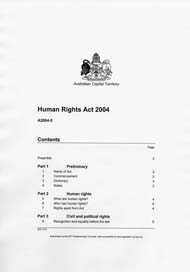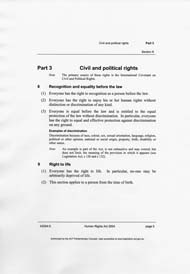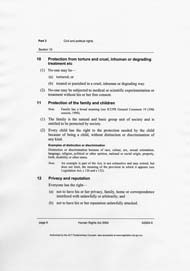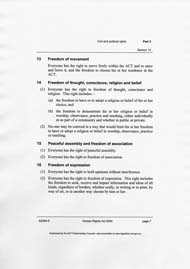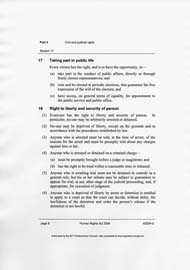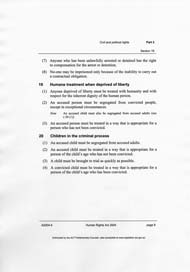

Human Rights Act 2004 (ACT)
Significance
This Act, the first general legislation on human rights in Australia, aims to ‘respect, protect and promote’ the civil and political rights it defines and recognises. The Act provides for the establishment of an Australian Capital Territory Human Rights Commissioner and empowers the ACT Supreme Court to make declarations on the compliance of legislation. This role for the Court provides for a new ‘dialogue’ relationship between parliament and judiciary on human rights matters.
Enactment of legislation of Australia’s state and federal parliaments is by Assent, which must be signed by the Queen or her vice-regal representative – a State Governor, or the Governor-General. By contrast the ACT enacts its own laws, by notification.
The Legislation Act 2001 provides for notification by online publication on the register of legislation accessible at www.legislation.act.gov.au. The Human Rights Act 2004 was enacted on 10 March 2004.
History
A framework for developing a ‘human rights culture’ in everyday life in the ACT was included in a comprehensive social plan the ACT government led by Jon Stanhope published in 2002. This ‘enduring task’ is a broad approach based on community education as well as legislation. Under its Discrimination Act 1991, the ACT had a Discrimination Commissioner to investigate complaints. Former ACT Chief Secretary Rosemary Follett held this office from 1997 until 2004 when this Act incorporated the role into that of Human Rights Commissioner.
A key role of the Human Rights Commissioner is to review ACT legislation for compliance with the Human Rights Act. The Supreme Court can issue a Declaration of Incompatibility, but is not empowered to declare such legislation invalid. This ‘dialogue model’ between the judiciary and the legislature instead depends on government responding to such rulings on inconsistency.
The Act provides for consideration of some international human rights instruments accessible to the public. As well as the Act, five United Nations instruments are made accessible by publication on the ACT legislation register:
- Convention against Torture and other Cruel, Inhuman or Degrading treatment
- Convention on the Elimination of all Forms of Discrimination against Women
- Convention on the Rights of the Child
- International Covenant on Civil and Political Rights
- International Convention on the Elimination of all Forms of Racial Discrimination
Australia has no other such law recognising the fundamental civil and political rights of individuals, though most western nations have enacted human rights legislation, or have human rights guarantees in their constitutions.
Description
| Long Title: | An Act to respect, protect, and promote human rights |
| No. of pages: | 34 pages |
| Provenance: | Legislative Assembly of the Australian Capital Territory |
| Features: | Electronic document |
| Location: | Online at www.legislation.act.gov.au |
| Reference: | Act 5 of 2004 |
